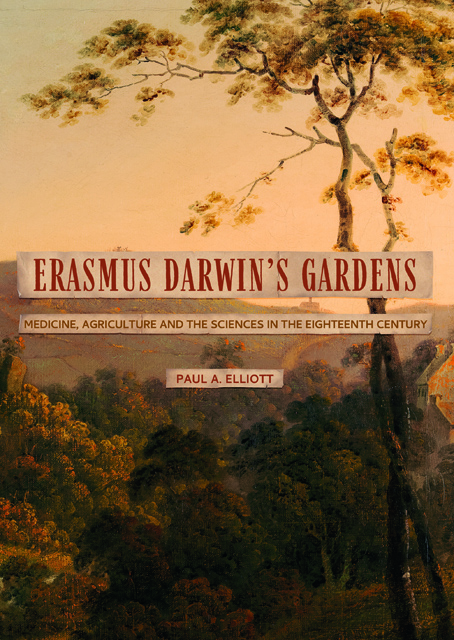Book contents
- Frontmatter
- Contents
- List of Figures
- Acknowledgements
- A Note on Plant Names and Identification
- Introduction
- 1 Lichfield and Derby Gardens
- 2 Medicinal Plants and Their Places
- 3 Agricultural Improvement: Enclosure and the Application of Science and Technology
- 4 Vegetable Physiology, Technology and Agriculture
- 5 Vegetable Pathology and Medicine
- 6 Among the Animals
- 7 Animal Diseases
- 8 ‘Eating of the Tree of Knowledge’: Forestry, Arboriculture and Medicine
- 9 Trees in the Economy Of Nature
- Conclusion
- Select Bibliography
- Index
- Garden and Landscape History
3 - Agricultural Improvement: Enclosure and the Application of Science and Technology
Published online by Cambridge University Press: 14 January 2023
- Frontmatter
- Contents
- List of Figures
- Acknowledgements
- A Note on Plant Names and Identification
- Introduction
- 1 Lichfield and Derby Gardens
- 2 Medicinal Plants and Their Places
- 3 Agricultural Improvement: Enclosure and the Application of Science and Technology
- 4 Vegetable Physiology, Technology and Agriculture
- 5 Vegetable Pathology and Medicine
- 6 Among the Animals
- 7 Animal Diseases
- 8 ‘Eating of the Tree of Knowledge’: Forestry, Arboriculture and Medicine
- 9 Trees in the Economy Of Nature
- Conclusion
- Select Bibliography
- Index
- Garden and Landscape History
Summary
Erasmus Darwin’s most important contribution to the science of farming was the publication Phytologia, a major treatise on agriculture and gardening that attracted some contemporary praise. More recently, Robert Schofield was puzzled that an ‘elderly, established doctor’ with ‘little public indication of an interest in agriculture’ should have published a treatise on the subject. And while Maureen McNeil argued that Darwin’s inspiration lay primarily in Scottish writings concerning agricultural improvement, the Agricultural Revolution and the ‘scarcity crisis of the 1790s’, along with some aspects of Linnaean botany and the creation of the Lichfield botanic garden, she still found it hard to explain how these provided ‘sufficient stimulus for a six-hundred page treatise on agriculture’. While some interest in the technologies of agricultural improvement and plant physiology were already evident in Darwin’s commonplace book from the 1770s, for McNeil ‘explanations of Darwin’s agrarian interest’ founded only upon his ‘personal situation’ are ‘inadequate’ and she saw ‘no necessary transition’ from prose and poetical ‘nature studies’ to agriculture. His medical interests did not provide a full explanation either, given the small part of agriculture that was devoted to generating ‘tools of medicine’. However, this underestimates the extent to which he mixed with farmers and landowners throughout his career, the extent of his experiences combating animal and plant diseases and the impact of his medical ideas and experiences upon his analyses of agriculture and horticulture.
Darwin was a strong supporter of the Georgian ideology of improvement, which, as Raymond Williams argued, like the notion of ‘cultivation’, contained meanings that were ‘historically linked but in practice so often contradictory’: ‘working agriculture’ existed alongside the costly ‘improvement of houses, parks, artificial landscapes’, interweaving the desire for increased wealth and productivity with landscape aesthetics reinforced by moral judgement. This chapter argues that Darwin’s belief that the sciences and medicine could be used to better harness nature and help realise a more productive countryside is evident in Phytologia, his medical treatise Zoonomia and the references to agriculture and gardening in his poetry and correspondence. McNeil has argued that, as such, his emphasis was on the ‘intellectual, rather than on the manual aspect’ of farming and that he was ‘eager to celebrate’ both agricultural as much as industrial ‘capitalists’ as ‘social heroes’ as well as those who helped encourage farmers to better organise their ‘space, capital and time’.
- Type
- Chapter
- Information
- Erasmus Darwin's GardensMedicine, Agriculture and the Sciences in the Eighteenth Century, pp. 91 - 116Publisher: Boydell & BrewerPrint publication year: 2021



